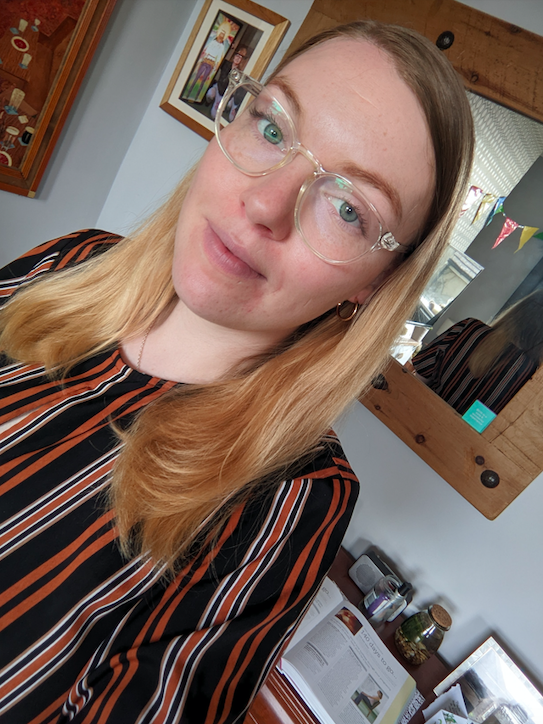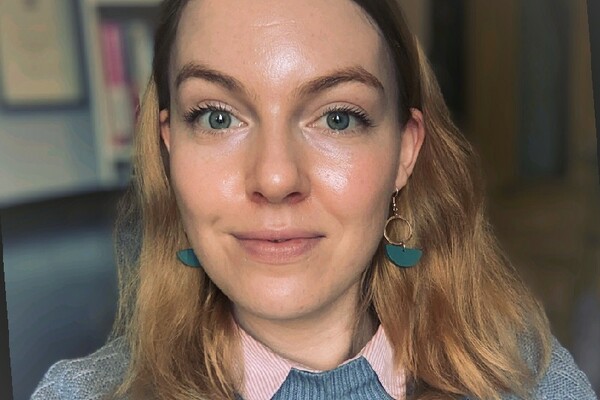Newly appointed to our board of trustees we had the great pleasure to interview Nathalie Tolmie-Thomson about her experience of being a young trustee and her thoughts on the direction of the Foyer Federation. With first-hand experience of homelessness and the positive environment Foyers offer to young people, Nathalie brings her unique insights to the Foyer Federation team. Nathalie's determination to overcome challenges and achieve her goals is testimony to her resilience, focus, and grace.

Hello Nathalie, tell us about yourself, where are you from, what do you do and what are your interests?
I was born and bred in Bradford and lived in Leeds for a while, I graduated from Leeds Trinity University before completing my master's degree in Psychology at Edinburgh University. Now I work at the University of Leeds, originally doing paid media and now copywriting work. In the future, I'm keen to move into more Project Management and Business Analysis roles, more of the decision-making side of things. In terms of personal interests, I'm a keen reader, I like to get out in nature, I like to write, I'm learning French, I play a little bit of piano, I like to play video games, to cook and I recently discovered my Jewish heritage so I've been attending synagogue and studying the Torah and learning more about Jewish rituals and things along those lines.
What brought you to be a trustee at Foyer Fed?
I'm looking forward to working as a trustee with The Foyer Federation! The opportunity came along and I just had to go for it because of my background – I was made homeless at 16 and lived in supported accommodation for 3 years. During those years I was very reluctant to tell anyone that I’d been made homeless, I wanted to appear as normal as possible and I felt like it would hurt my prospects to talk about it. In actual fact, the skills and experience I gained during that time will serve me for the rest of my life. Being a trustee at the Foyer Federation is an excellent opportunity to take everything I learned from that experience and pay it forward, particularly as it was a charity that saved me, the Bradford City Centre Project. They really did save me and I owe them a lot, so this is my way of doing my bit.
How long have you been the trustee with the Foyer Federation and what’s it like?
I’m very new! I recently attended my first board meeting following some preliminary meetings via video call. In terms of my role within the Foyer Federation, that's yet to be determined really. I have expressed my desire to take on project or business management support because I need that experience anyway, so it'd be an excellent opportunity to serve us both. I recently joined my first board meeting which I very much enjoyed. Part of the meeting included a tour of the accommodation in the service where our meeting was being held. It was such a great idea to incorporate a tour within the board meeting because it really brought us down to earth in terms of why we were there. A young resident showed us around their flat, and I completely saw myself in them. They’re doing absolutely amazing. After the tour and speaking with the resident we were all laser-focused and so enthusiastic in the board meeting based on what we’d seen and heard.
During the meeting we were asked to consider the meaning of ‘Foyer’, each of us giving our insights and we tried to consider it from different perspectives; the young person, the stakeholder, etc. It was great to hear from the service provider about their perspective, for example, it was good to hear about their concerns and reservations. I had so much to say about what I experienced personally vs what I'd seen at the accommodation that day – I think they were polar opposites! We also considered what makes a bad service vs a great service, both of which I’ve now experienced. We could definitely see what to avoid and what to aim for through that activity.
Have you used Advantaged Thinking in your own life?
Yes, I was made homeless in April – right before my AS level exams. As a result, I decided that there was just too much upheaval for me to complete that year, so I took the difficult decision that I just needed to start again. I transferred to a different college to study a BTEC rather than A Levels, to protect my very limited headspace from all the trauma I’d experienced. Previously I’d been a top student so it was a real blow for me to change direction like that, and I had to pick myself up off the ground. However, in terms of Advantaged Thinking, I already had confidence in myself that I was going to be okay because of how I’d done in school previously. I believed that as long as I could get to University I could start again, and it was that focus on my assets and my goals that kept me going.
In my situation, I never spent a single night on the streets. When I was made homeless I stayed over at a friend's house that night, and then the next day was pointed in the direction of the Bradford City Centre Project. They confirmed by contacting my family directly that it would be a danger to my safety to return home, and they immediately put together paperwork for me to stay at their hostel – it just so happened that there was a space, so I moved in later that day with my little suitcase, it was pretty much all I had. The relationship I had with my parents at the time was very challenging, and being 16 years old it's really very hard to have the courage to just block all that out. You don't know how to do it on your own at that age, it was complicated. The support worker I had was incredibly supportive and really helped me with life skills around emotional intelligence and the importance of a positive outlook on life.
My understanding of Advantaged Thinking is that it's about looking at young people as full of potential and opportunity, focusing less on what happened to them and enabling the guidance and support that they need. In my case, I was very lucky to have the specific support workers that I had because it is very much luck of the draw in terms of how invested a person is prepared to be you. Even though my parents weren’t great, education was still a priority, so I think that outlook saved me, and then BCP made sure I got over the line. Also, although I didn’t know it at the time, another asset was my Aspergers which was later diagnosed during my degree at Edinburgh. Being neurodivergent helped me to remain single-minded and pull through. The psychologist I spoke to who officially diagnosed me said that Autism played an important role in my success as it allowed me to stay hyper-focused on what I was doing and compartmentalise everything else. I think that extra layer has really allowed me to appreciate the added strength that that would give.
How important is it to have the voice of young people represented on our board of trustees, and what are the unique insights you’re able to bring to the table as a young person?
I believe it to be fundamental. If we're representing young people then we have to have a young person's voice on the board. It's essential because the challenges that face people are different generationally. Gen Z is probably the most challenged generation in terms of the complexity of the welfare system. There's so much red tape and bureaucracy, there are so many boxes that you have to tick to be considered a functioning member of society, and when you have everything taken away from you and your parents haven't been there for you - you are on your own. If you don't have anybody helping you, giving you support – you're lost. Even though it's incredible that organisations like Foyer Federation exist, they have to always bear in mind exactly the concerns of that particular generation that they're working with. For example, I was in that homeless situation relatively recently from 2010 to 2012, and even since then, things have changed a lot since then in terms of policy, law, and the benefits system. Many contracts now go to big corporates, so the touch of the small organisation has been lost, along with that need for close connection with young people. It just isn't there in the same way.
Similarly, access to mental health services, education, and all the things that give you the foundation to step into adulthood positively are completely random and a postcode lottery. There's a lot of variance currently in terms of the support and experience you get, and I know that The Foyer Federation are wanting to improve that so that the outcomes are similarly bright for everyone. In the meantime, you need that young person's input to make sure that happens because otherwise, you're guessing!
What do you find most rewarding about being a trustee at Foyer Federation?
Being a trustee is hard to describe, but it really feels like a full-circle moment. I've come such a long way – starting from a position that made me feel so let down, feeling that I had a start to life on the bottom rung and that I'd lost everything – to be here now on the other side of the table as a trustee is fulfilling beyond words. I never really took stock of just how severe things actually were for me, and so to be here now having achieved everything that I have achieved feels incredible. To see the Foyer resident at the board meeting tour was breathtaking to me. That person's doing better than I did back then - they've got two jobs currently and University lined up. Their flat was spotless! They just had so much confidence and a sense of self, and you can tell that's come not just from their own inner strength but from the support that they've been provided with in the environment. I want to feed into that as much as possible because we need more success stories!
Have there been any challenges to the role?
Nationally it’s frustrating that many employers don’t give employees time allowance to do charity work, especially given the cuts in social care, it seems short-sighted. There’s an untapped opportunity in our workforce to really help and also those employees would learn a lot of transferrable skills. Personally, I've learned that there are a lot of different perspectives on the board of trustees, and I need to make sure that I properly listen to everyone. For example, Dami, our other young trustee, is coming to the table with her own unique set of skills and life experiences, so I have to be mindful to make sure that I'm listening to her as well as waxing lyrical about my own experiences! That’s a skill that I need to work on. As well with other members of the board, these are people that have been doing this for many years and have years of experience in this sector, they understand things that I potentially don't at this stage. Being part of the board is bringing me opportunities to learn how to actively listen and contribute, and I’m looking forward to doing more of those.
What do you think are the top priorities for The Foyer Federation?
Making sure that there’s a good sense of brand identity within the sector, building the national brand profile, and ensuring that the Foyer offer is universal so everyone is getting a similar high-quality experience. I think it's fundamental that Foyers gain accreditation based on values and standards that have to be maintained and regularly monitored. Generally, there needs to be more work done on bringing Foyer Federation and similar organisations into the limelight because very few people in society know what a ‘Foyer’ is. Boosting the public profile of Foyers would showcase the work we do with the wider community, for example talking about how local organisations work together.
Creating more opportunities for young people to be involved, for example, we could incentivise survey responses. There are young people in Foyers that want to go above and beyond, and it looks great on a CV for job or University prospects to have experience of contributing before they've even left the service. So it’s a matter of considering how to do that in a way where everyone benefits and without young people feeling overwhelmed. I'd also be interested to see how equality and diversity are implemented in services to make sure all young people are being provided for equally.
Lastly, we can always be doing more to look after people's mental health and encourage resilience. From what I hear there are some really good operational measures in place within the Foyer system, and as soon as a young person arrives they get their needs assessed. We need to continue to make sure that people get the specific support that they need. Emotional resilience is something that I still struggle with because I think these are skills that you learn in early childhood, so if you've not picked them up from parents who are supporting you, I think that can cause long-lasting damage, so there's lots to be done there. Having a master's degree in psychology means I can provide specific input to the board here too.
Can you describe a particular success story since working as a trustee with Foyer Federation, an achievement either personally or organisationally that you're particularly proud of?
The greatest success is how receptive everybody has been on the board and within the organisation because I feel like I've tried so much over the years to give back to society in one way or another, and until now I’ve found that incredibly frustrating and disheartening. In the case of The Foyer Federation, it's like the planets have aligned. I've found this organisation that wants me and is interested in and values what I have to say, and the skills I have to give. To hear someone say that they want to use what I have is very validating to me. I trained for this, I wanted to follow a trajectory of clinical psychology. So for me to work with a group of people on this is fabulous and I'm so pleased that everyone's been prepared to take a chance on me and I just can't wait to give back. I hope it's a relationship that lasts a long time.
What are your hopes and dreams for the future of young people that the Foyer Federation supports?
I hope that we can turn the situation around for young people facing homelessness. I hope we can create a system that's able to prevent the kind of long-term damage caused by their voices just being ignored or erased. When a young person is made homeless, at that moment we have an opportunity to stop further damage from happening - especially with the way the Foyer Federation wants to do things. There is such potential to completely transform a huge section of society from getting to that damaged place. As long as the people that fund us continue to believe in it, I think we can do incredible things. Right now it feels so desperate and like it's getting worse, we have to do something and the Foyer Federation exists as a shining light – it’s an exemplary example of how we can turn things around.
When I read the Adventures in Advantaged Thinking series I was punching the air! I'd never seen anything like it before, and it was beautifully designed too. It's an incredibly versatile document, it won't just be useful for youth homelessness services, you can apply this for anything. Anywhere where young people need to be prioritised, there are so many different sectors where it could be transformative. It'd be great if it could be formally published and got onto people’s bookshelves!
What’s next for Nathalie – future plans?
Motherhood and building a really strong family are my priority. I think that the satisfaction of life comes from the little things that you do every day, so I'm looking forward to getting involved more in the community and making sure that I'm a good citizen, being a good neighbour, and contributing to society. Going forwards I want to dedicate a large proportion of my life to enabling people who've experienced similar to myself and to think that as a trustee I can be part of something that creates more success, more ‘zero to hero’ moments – that’s just next level.

